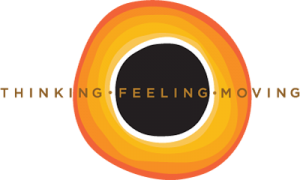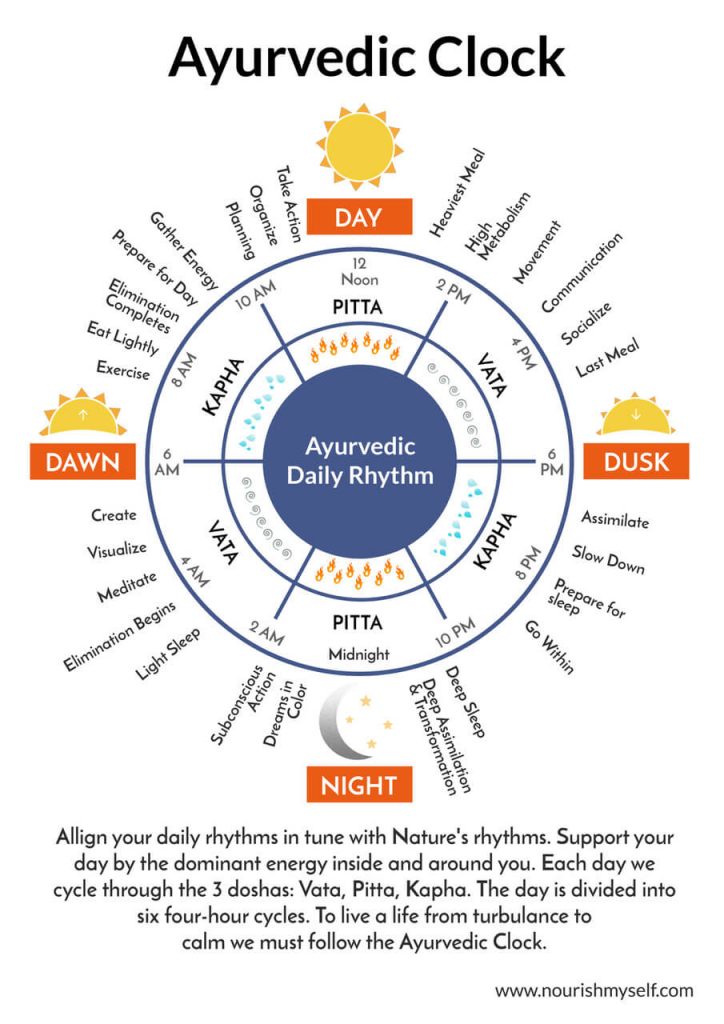How have you been sleeping? Have you found that your sleep patterns have been increasingly disturbed? The numbers are in. More people are having difficulty sleeping these days, particularly during the pandemic. A recent study in the US showed that the adult population 30-50% have insomnia. The Covid-19 pandemic has affected mental health heightening anxiety and sleeplessness. The more anxious we are, the more it keeps us up at night. The Pandemic certainly has given us many reasons for sleepless nights. So what can we do? This blog serves to give practical solutions which will improve your chances of sleeping with natural Yogic and Ayurvedic practices as well as providing more of an understanding around insomnia. Your body wants to be in balance and thrive in nature as its default position. When we allow for this to happen, the easier it is for our bodies to be healthy. Unfortunately we tend to live lives which are quite far removed from nature to enable this to happen.
The painful experience of insomnia
The known causes of insomnia
How can we heal insomnia?
How can we heal insomnia with Yoga and Ayurveda?
-
The Circadian rhythm
-
The Ayurvedic clock
-
Ayurvedic Practices
-
Yogic Practices
-
Lisa’s free gift for you
The painful experience of insomnia
Mark Stephens describes insomnia as a sleep disorder that is experienced repeatedly for a long period of time. People may have difficulty in getting to sleep and/or staying asleep both known as sleep onset insomnia and sleep maintenance insomnia. Th DSM-V recognises within the classification of insomnia additional early morning awakening and having difficulty getting back to sleep, which disrupts regular daily activities for 3 or more times a week for a period of 3 or more months. People who have a shortened period of difficulty sleeping may have what is known as transient insomnia, which although is quite troubling is not long lasting.
Insomnia is stressful and can compound into other difficulties such as increased clumsiness, irritability, decreased cognition and increasing incidences of depression and anxiety. If not treated it can lead to high levels of stress hormones in the body, diabetes, sore muscles, headaches, tremors and memory lapses.
“Sleep disorders are associated with significantly higher rates of healthcare utilization and expenditures.” -Journal of clinical Sleep Medicine.
The known causes of insomnia
Two main schools of thought are that the causes can be both cognitive and physiological. The cognitive is overthinking when in a hyper aroused state which accounts for times of anxiousness and increased numbers during the pandemic. Physiological aspects are numerous with high levels of cortisol, metabolic factors, glucose utilization and hormones. (Mark Stephens) When trying to understand the causes of insomnia, it is important to try to understand the root cause as to why the imbalance is happening in the body in the first place. It is worth considering your lifestyle and making adjustments accordingly.
How can we heal insomnia?
When seeking medical intervention, ‘sleep hygiene’ is used to describe what is considered as good practice prior to sleep that people can modify in their lifestyles. Sedatives as prescribed medicines are often used as treatment from Melatonin, Antihistamines, Antidepressants, and Antipsychotics. Herbal treatments such as valerian root are also common. Interestingly Stephens goes on to say that research shows that cognitive behavioural therapy is equally effective as medications in short- term treatment.

During lockdown in 2020 I woke up with the sunrise which helped with maintaining my circadian rhythm.
How can we heal insomnia with Yoga and Ayurveda?
The good news is that more studies are showing that Yogic and Ayurvedic practices are helping bodies to get a good nights sleep by being in balance with itself and with nature. In understanding how this is so we need to understand a little more about the Circadian Rhythm and the Ayurvedic Clock.
-
The Circadian rhythm
Circadian rhythms are 24-hour cycles that are part of the body’s internal clock, running in the background to carry out essential functions and processes. One of the most important and well-known circadian rhythms is the sleep-wake cycle.
Different systems of the body follow circadian rhythms that are synchronized with a master clock in the brain. This master clock is directly influenced by environmental cues, especially light, which is why circadian rhythms are tied to the cycle of day and night.
When properly aligned, a circadian rhythm can promote consistent and restorative sleep. But when this circadian rhythm is thrown off, it can create significant sleeping problems, including insomnia. Research is also revealing that circadian rhythms play an integral role in diverse aspects of physical and mental health. (Sleep Foundation)
-
The Ayurvedic clock
Yoga International explains that most of us break the day into work time, our time, and sleep time, with work time generally allotted the most number of hours. Ayurveda sees the day differently, breaking it into six four-hour zones—one day zone and one night zone for each of the three doshas. To live a balanced life—and enjoy the good health it brings—we need to keep our daily rhythms set to the age-old ayurvedic clock.
According to this symbolic timepiece, the day starts at sunrise, with the cool, heavy, earthy kapha dosha holding sway from 6 a.m. to 10 a.m. The middle of the day—from 10 a.m. to 2 p.m.—belongs to pitta, the hot, sharp, and fiery “king of digestion” dosha. And light, dry, airy vata rules the afternoon, from 2 p.m. until 6 p.m., after which the cycle begins again.
In Ayurveda, 24 hours can be divided up into different energies that the body cycles through.
“ I compare the ayurvedic clock versus the modern understanding of circadian rhythm and all the different stimulating hormones and the timeframes during which they are supposedly output. What Ayurveda has been saying for years is matching what’s being found now.” – Lori Rubenstein Fazzio Clinical Professor of Yoga and Health
Getting the body back in tune with nature can have a profound effect on the ability to have better sleep. The University of Colorado conducted a study on levels of melatonin and cortisol levels in a group of insomniacs. Ideally melatonin increases around sunset, and is quite low during the day. Cortisol which is a stress hormone is normally higher during the day and decreases around sunset. In the study, the group of insomniacs went camping in the mountains away from city lights and technology for one week and restored 100% of the circadian clock. In a follow up study a weekend camping trip where participants went off grid, measured a 69% restoration of circadian rhythms in the participants of the study. (Dr. John Douillard) This is a wonderful example how getting back into nature is enough to bring the system back into balance.
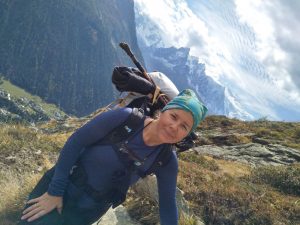
Opportunities for nature therapy help your body and mind to be in balance.
-
Ayurvedic Practices
- Wake up at the same time each day. Be up for the sunrise.
- Go to bed at the same time. Try to be in bed by 9:30pm and earlier in winter if possible.
- Exercise the same time every day. Ideally in the morning (kapha time between 6 and 10am).
- Eat breakfast lunch and dinner the same time every day.
- Try not to eat a large meal past 6pm.
- Get exposure to sunlight (even if it is cloudy) for 20 mins a day.
- Abhyanga (self oil massage) For a wonderful explanation and demonstration of how to practice Abhyanga see the Mudita Institute.
- Nasya (a little warm oil in the nostrils) Helps you to breathe more easily when you are sleeping. It calms the central nervous system and pacifies Vata particularly at 2am when Vata time kicks in. Anu Thallam is a a recommened oil to use by BioVeda do first thing in the morning. Alternatively warmed cold pressed black organic sesame seed oil may be used.
- Drink a glass or warm milk. Add a little honey.
- Avoid sleeping tablets as they disrupt the natural sleep responses of the body.
- If you do take Melatonin, try to take a low dosage.
Things to avoid:
- Caffeine after 1pm.
- Naps longer than 10-15 mins after your mid-day meal.
- Exercise after sunset
- Screen time two hours before bed. Use blue light blockers if watching screens at night.
- Difficult mental activity (work) after 7pm.
-
Yoga Practices
There are many yoga practices which when regularly practiced helps people to sleep. To have a vigorous asana practice in the mornings which stimulate the body are very beneficial. This is when practices such as Surya Namaskar or sun salutations would be ideal, providing that they are suitable for your individual body. In the evenings a more calming poses that are held for several minutes at a time would be appropriate as they help the body to relax and let go of the stress that has accumulated throughout the day. All of the following poses are very calming to practice in the late afternoon or early evening.
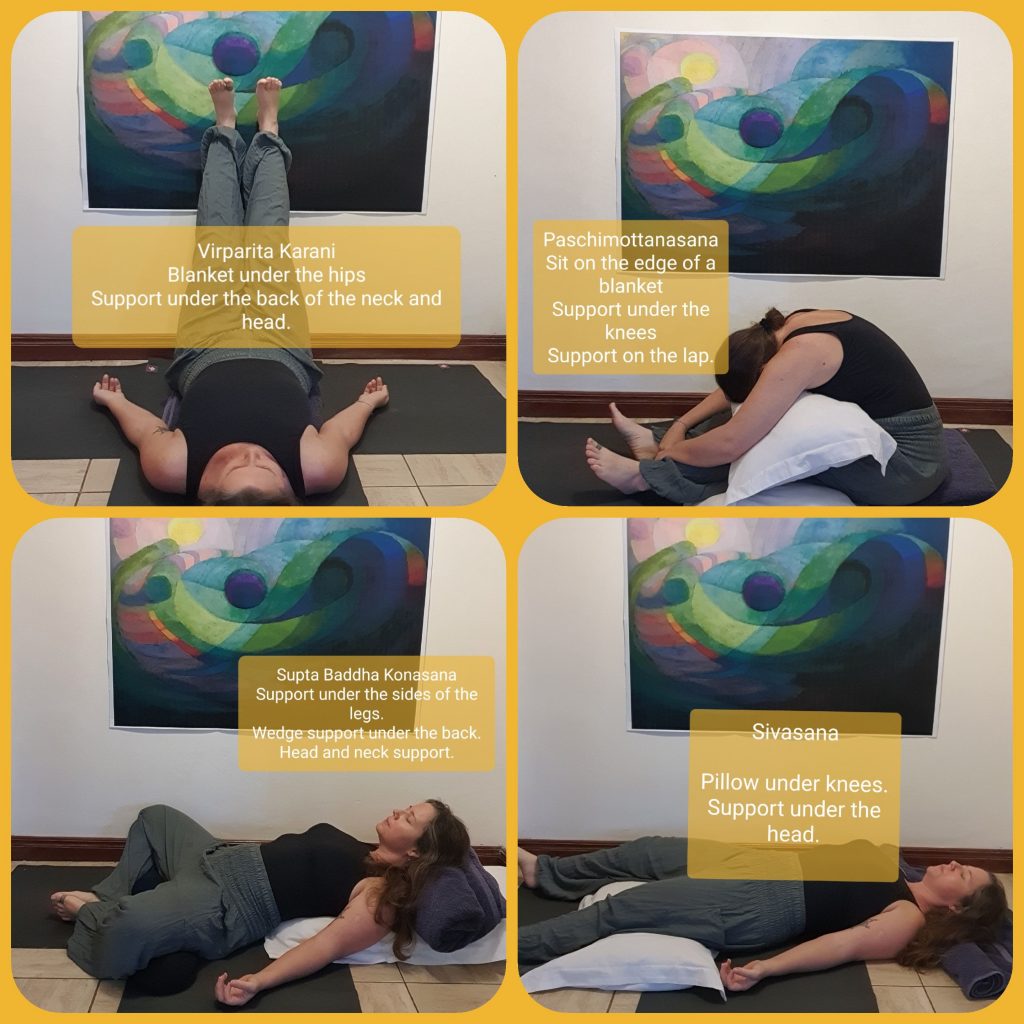
These supported asanas with use of props are good for calming your system in preparation for a good night’s sleep. Hold some or all of these poses for 20 minutes.
“Yoga practice in the morning has been found to increase parasympathetic drive at night causing sleep to be more restorative which may explain significant improvement in sleep quality ratings…”
– Panjwani U,Dudani S, Wadhwa M.
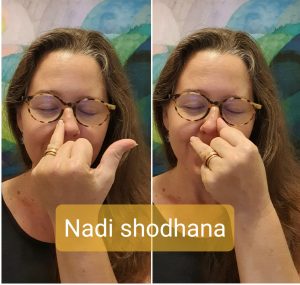
Alternate nostril breathing-helps to balance the energy of the body.
Pranayama
Nadi Shodhana (alternate nostril breathing) is a yogic breathing practice which is commonly taught. It is useful as it has a calming effect on the body and mind when it is feeling overstimulated, and can also lift the body when feeling sluggish. It balances the major energy lines of ida and pingala in the body to create balance.
Lengthened exhalations, and breathing in to the lower abdomen as opposed to only breathing in the upper lobes of the lungs also can also help the body to release tension and relax. There are many different breathing techniques in yoga which is why it is important to learn from a trained teacher so they can upon assessing your need, direct you a specific practice suitable for your body.
Yoga Nidra (yogic sleep) is a form of meditation which can be practiced by people whom have little experience in meditation therefore making it quite accessible. There is a growing level of evidence demonstrating that Yoga Nidra is having excellent results in helping people to sleep whom suffer with insomnia.
“There was an improvement in sleep quality, insomnia severity, depression anxiety and stress scores after yoga nidra. The improvement remained even after 3 months of start of intervention. Yoga nidra can be used as an important adjunct in management of chronic insomnia patients.” Datta, K., Tripathi, M. & Mallick, H.N.
“Remotely delivered Yoga Nidra is feasible to deliver, and demonstrates potential benefits for anxiety and insomnia, warranting additional research.” Sharpe E, Butler M, Hanes D, Bradley R.
- Lisa’s free gift for you
Yoga Nidra is an effective tool available to manage your stress and anxiety, helping you to have a better sleep in the evenings. Ideally Yoga Nidra is best practiced earlier in the day (perhaps after lunch or work) and it only takes around 30 minutes to practice. A bank of Yoga Nidra’s are available for you free on my YouTube channel Thinking Feeling Moving. These YouTube recordings can be downloaded to your devices to view anytime anywhere. There are also many Yoga Nidra recordings on my Insta and FB live recordings.
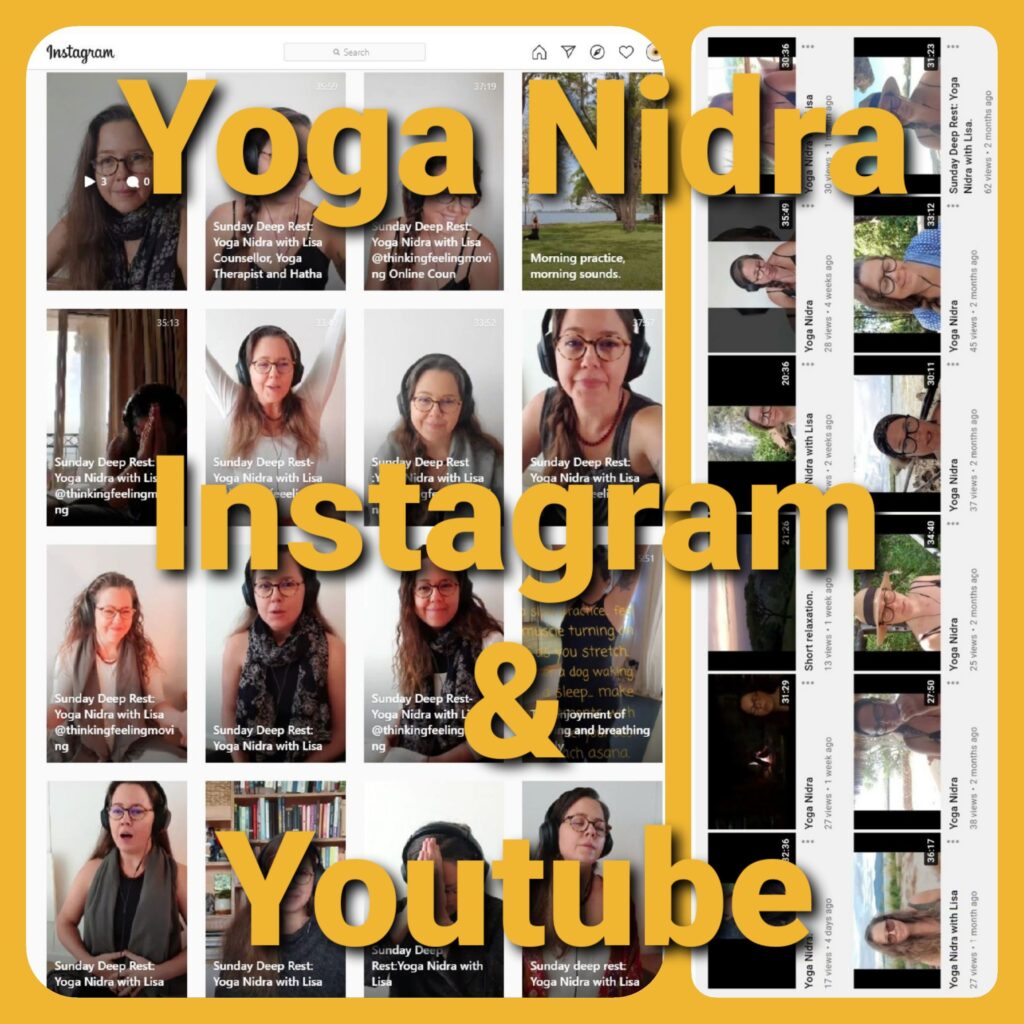
Including Yoga Nidra into your daily self care routine.
It is my hope that I have been able to share with you a little more understanding around insomnia and why it may be a challenge for you, as well as providing you with tools and lifestyle practices that you can use straight away to help you to get a good nights sleep.
Sweet dreams.
Namaste,
Lisa.
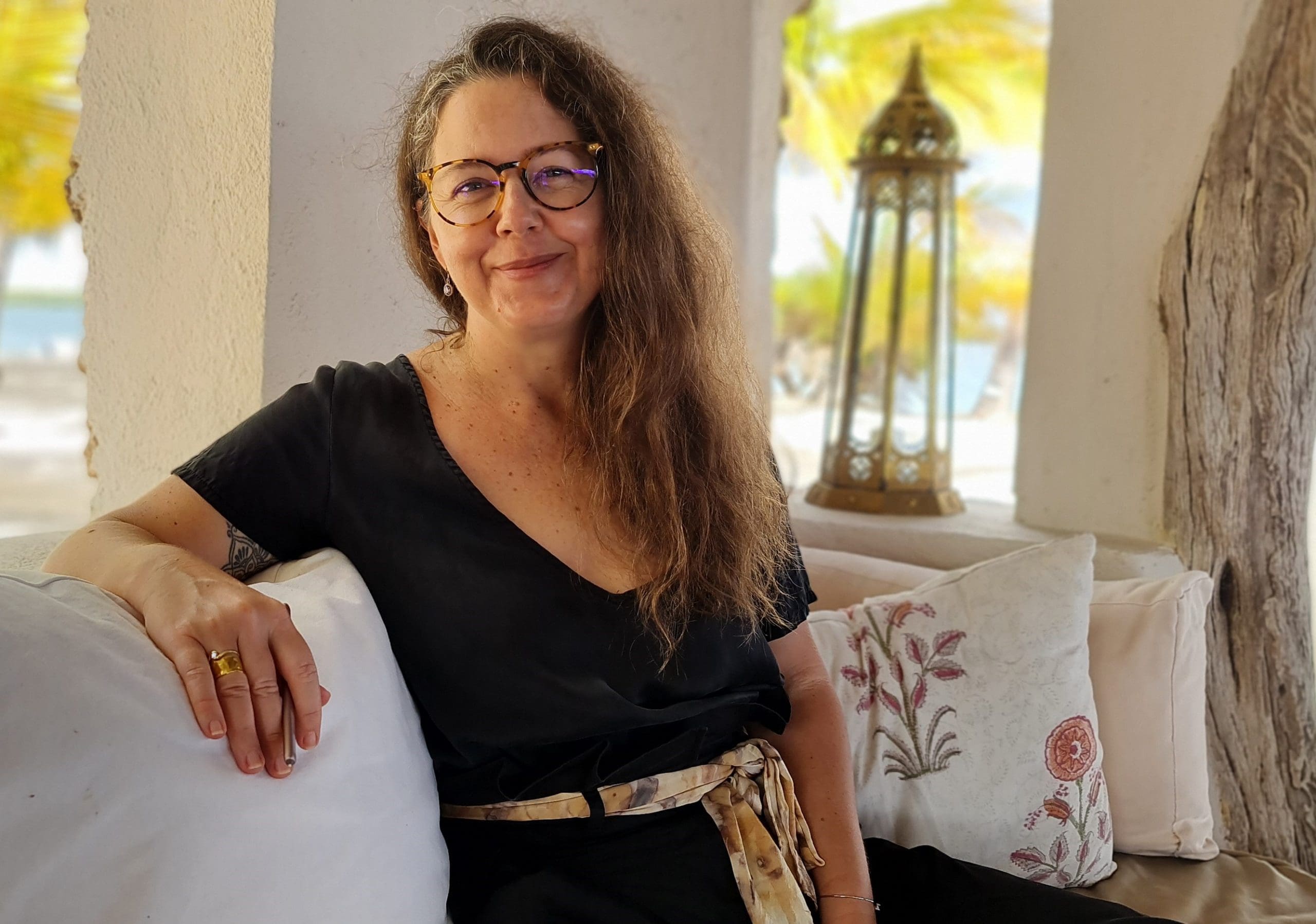
Lisa McGarva -Clinical Sexologist, Relationship Therapist, Counsellor, Yoga Teacher, Yoga Therapist and Educator. Lisa is the founder of Thinking Feeling Moving, an online global Private Practice where clients can access better health in their mind, body, and in their relationships. Online sessions available globally, you may make a booking through the website https://www.thinkingfeelingmoving.com
Clinical Sexology + Relationship Therapy + Counselling. Thinking Feeling Moving is a LGBTQIA+ friendly safe space, GSERD aware and sex positive. Lisa is pluralistic in her approach drawing on many theories and techniques to best suit the client’s needs.
Yoga Therapy sessions. Are programmes which are individually designed for clients. After a consultation, Lisa creates a specialised filmed yoga class just for you. This class can be downloaded to your device. The programme is updated as your body heals and comes back into balance. Yoga Therapy is an intensive individualised programme to bring your body back into balance in recovering from illness, injury, surgery or if you are requiring a practice and have high needs with your body. Lisa is a 500hour trained Yoga Teacher (Yoga Australia), and Certified Yoga Therapist (International Association of Yoga Therapists). Private Yoga Classes are also available online.
Reconnection Retreat. Awaken and expand your sexuality and intimacy possibilities.
A tailored package designed just for you, offering a holistic approach of Clinical Sexology, Relationship Therapy and Yoga Therapy. Elevate your sex life and enrich your relationship/s. This package is for clients who wish to attend Therapy in a concentrated amount of time. Immerse yourself in healing and pleasure, combining it with your time off. A chance to really get away and attend to what is important to your life. Lisa can meet you globally as your personal Therapist at a negotiated destination.
Lisa’s YouTube channel is a space for deep rest where you can find dozens of guided Yoga Nidra Meditations filmed in beautiful places around the world. Access deep rest for your body and mind anytime on your device. Lisa also hosts many interviews with prominent leaders in the areas of Sexology, and Yoga Therapy.
She is global calling a few different continents home which is why she works primarily online. She loves travelling with her Husband who is a fellow explorer in travels, experiences and love.
